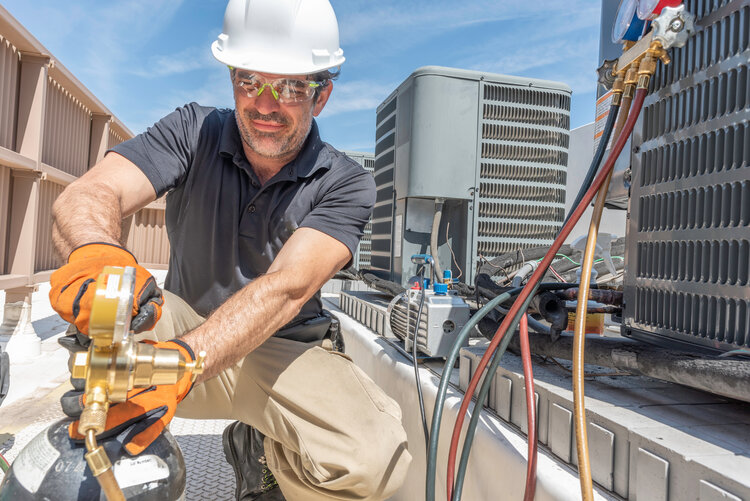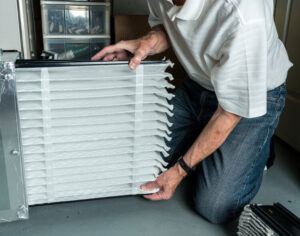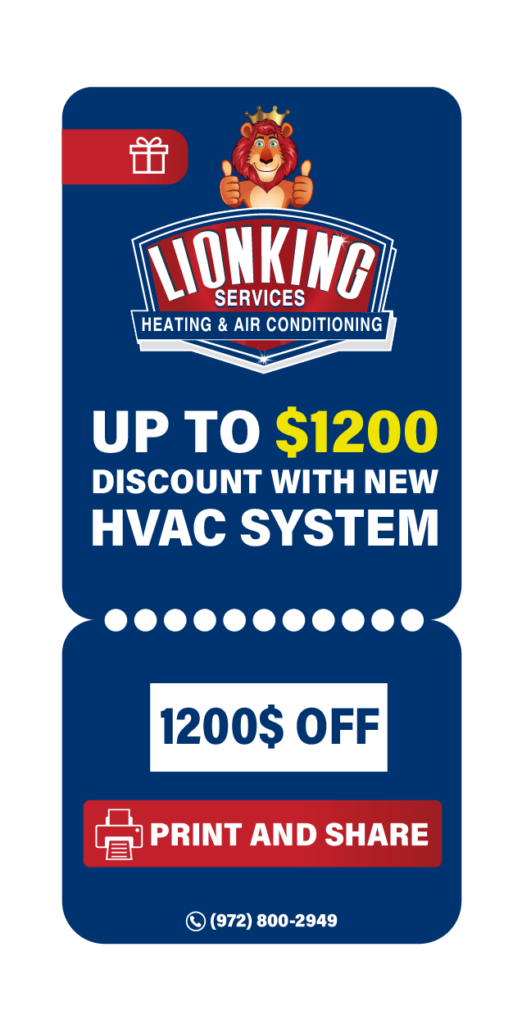Benefits of Performing Furnace Tune-Ups:
- Ensures proper airflow and efficiency
- Keeps you safe from potential gas leaks or dangerous carbon monoxide levels
- Prevents breakdowns when you need it the most
- Maintains manufacturer’s warranty
8 Important Steps of a Furnace Tune-Up & Cleaning
Maintaining your furnace goes far beyond just cleaning your system. You must also inspect it carefully for damage, remove rust from the burners, and thoroughly sanitize the orifice. Certain procedures must be performed during a furnace tune-up appointment to ensure the heating system performs efficiently. Let’s take a look at eight important steps of furnace maintenance or tune-up service.
1- Inspect the Flame Sensor
Secure your multimeter in a series with the flame sensor and the sensor wire. Then turn the furnace on to ignite the heating cycle. Take a look at the sensor; this should read 1.5 to 4 uA. Check your system’s manual, however. Some manufacturer’s control systems only require a 0.5uA.
If your sensor test reads less than 1 uA, or 0.5 uA depending on the system, you’ll start to notice minor problems with your system until it eventually fails.
2- Perform a Combustion Audit
To perform a combustion audit, you must activate your combustion analyzer device outside the home to ensure proper calibration. Once you start the furnace, observe and record the highest CO level within the first minute of operation. This CO level can vary from 100 to 400 ppm when it comes to a natural-draft furnace. For a 90% condensing furnace, the CO ratings can vary from 100 to 1,000 ppm. Keep in mind that the CO levels in a gas furnace will vary depending on the manufacturer. It’s important to check your system’s manual to ensure the appropriate CO level.
CO levels help determine if you’re having any mechanical issues with your gas furnace. After starting your furnace, if the CO level falls below 100 ppm within three minutes, this indicates a hardware problem. On the other hand, it is abnormal for the CO level to continuously increase during a heating cycle. We offer furnace tune-up and cleaning services to homeowners in areas such as Flower Mound, Dallas, Garland, Frisco and Plano. To confirm your furnace is safe to operate, our team of certified technicians will inspect the CO levels of your furnace at the beginning and end of a heating cycle.
3- Perform an Audit of the Heat Exchanger
When it comes to a furnace tune-up, a visual inspection should always be done. This, however, requires a significant amount of patience and training. That’s why you’ll need a professional HVAC technician to carefully inspect your system. With the proper tools including a dye penetration system and inspection cameras, a professional technician will evaluate the metal fluke for holes or rust, and overall, make sure each system component is properly supported.
4- Remove & Clean the Gas Burners
Misaligned or contaminated burners are one of the top failures that occur with furnace systems. To avoid this, make sure your burners are clear of debris. Debris can hinder your gas flow and will cause your system to overwork itself.
5- Use an Ohmmeter to Investigate the Igniter
Evaluate your igniter’s resistance. If your furnace comes equipped with a silicon nitride igniter, you should see anywhere from 11 to 12 ohms. However, if you have a carbide igniter, you should see anywhere from 50 to 100 ohms. Once your igniter reaches outside these parameters, this indicates that your igniter should be replaced. We offer fast ignitor installation and furnace tune-up services near you in Tom’s River and other areas.
6- Inspect the Condensate Lines
To remove debris from your condensate lines, remove or blow out the P-trap and pressure tubes. Condensate lines are one of the most common issues of furnace malfunctions. If condensate lines operate for a long period of time, this can cause the pressure switch to lock out, which can be frustrating for homeowners.
7- Analyze the Internal Static Pressure
To begin this process, you must first detect if you’re working on a variable speed motor or a non-variable speed motor.
If you have a non-variable speed motor, your system will have a maximum design total external static pressure (ESP) of 0.50-in wc. On the other hand, a variable-speed motor will have a maximum design ESP of 0.80-in wc.
If you have an 80% induced-draft furnace, you want 130 cfm of supply air per 10,000 Btu. On the other hand, for a 90% furnace, you need 150 cfm of supply air per 10,000 Btu. To set the appropriate cfm, please refer to a fan chart. This helps you better-set gas pressure and heat exchanger temperatures.
8- Inspect & Modify the Gas Pressure
To effectively measure the gas pressure, clock the meter to ensure that the orifice is the appropriate size. From there, you can set the correct gas pressure.
Furnace manufacturers commonly provide an installation manual for natural gas. This usually ranges anywhere from 3.2 to 3.8-in. Of course, to properly ensure your gas pressure is inspected to the best degree, we recommend contacting an HVAC professional.
5 Signs That Indicate It’s Time to Schedule a Furnace Tune-Up
You count on a furnace system to help you get through those brutal winter months. So it can be extremely frustrating to wake up one morning to a broken system. The best way to avoid problems is to schedule routine furnace maintenance. Typically an annual furnace cleaning and inspection is ideal to ensure the condition of your system, but if you’re experiencing any of these five signs, you may need to get an inspection sooner.
1- High Utility Bills
You might not be able to detect any furnace malfunctions outright, however, you may start to notice a steady rise in your energy bill without any unusual heating activity to connect it to. For various reasons, a furnace system can start to overwork itself, causing your energy bill to increase over time.
2- Poor Indoor Air Quality
How is the air quality of your home? If you start to notice more dust gathering on your home’s surfaces, this may be due to your furnace system. Along with this, you may also notice stale air or an unpleasant odor. This indicates that your furnace system is dirty and will need to be professionally cleaned to remove any contaminants built up on your system.
3- Unusual Sounds
An easy indicator that something’s wrong, if you start to hear strange noises coming from your furnace system, contact an HVAC technician to perform an emergency furnace tune-up in areas such as Flower Mound, Dallas, Garland, Frisco and Plano. Specifically listen for grinding, groaning, humming, hissing, or dripping noises.
4- Reduction in Air Flow
Although your thermostat is set to a particular temperature, you may start to notice your air isn’t heating your home as effectively as it should. This could stem from poor airflow, which is due to the overheating of the system.
5- Allergies & Asthma Symptoms
Are you or your loved one experiencing a worsening of asthma or allergy symptoms? This could be an indicator of poor air quality. A furnace tune-up will help sanitize your system and fix any system issues that may cause poor airflow.
What Does Our Furnace Tune-Up Include?
Lion King HVAC Provides a Comprehensive Furnace Tune-up that Includes:
- Inspecting, adjusting, and ensuring that all working parts are functioning as they should.
- Cleaning your filters to improve your system’s efficiency and increase indoor air quality
As your trusted heating technicians, we strongly recommend that you schedule an annual furnace tune-up and cleaning. We are also available for any emergency furnace repairs or if it is time to replace your furnace.












